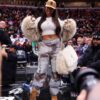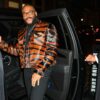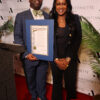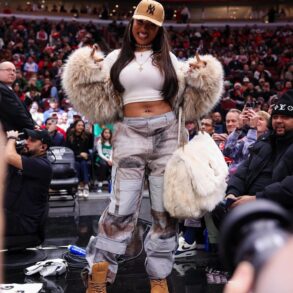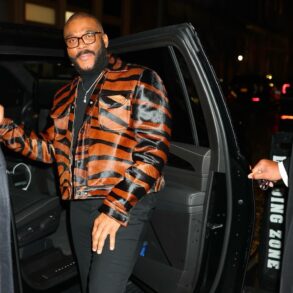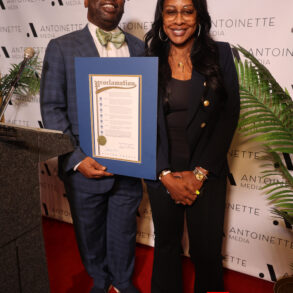Image
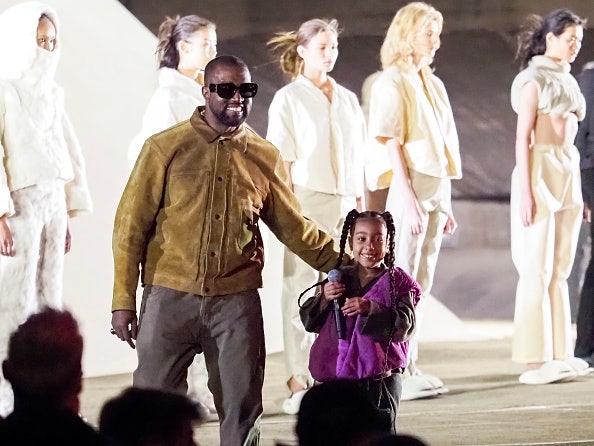
Image Credit
Arnold Jerocki / Contributor via Getty Images
Image Alt
Kanye West and North West
Rappers stepping into the fashion industry has been going on since the late ’80s and early ’90s. Brands like JAY-Z’s Rocawear and Diddy’s Sean John reflected their personal aesthetics and inevitably rose to fame alongside their music careers. Hip Hop mainstays not only bridged the gap between culture and style, but also proved that there was a demand from fans to get clothing designed by their favorite artists.
From Pharrell’s Billionaire Boys Club to Tyler, the Creator’s Golf Wang, the rapper-launched brands range from streetwear to high-end fashion. Many of them embody the personal journeys and artistic visions of their founders. That being said, some apparel labels only had limited success on the market, which either mirrored that of their creators or was caused by behind-the-scenes logistics. Nonetheless, this list explores how rappers-turned-designers have left a stamp on the fashion industry and the Hip Hop genre.
1. Yeezy
Although he previously used the moniker during his collaborations with Nike, Kanye West officially launched his Yeezy brand with Adidas in 2015. Thanks to releases like the Boost 350 V2 and the Foam Runners’ unique silhouette, West’s brand rapidly became one of the most lucrative partnerships in modern fashion.
Yeezy’s minimalist, military-influenced apparel featured inspired designs and neutral color palettes, with frequent appearances of distressing, custom-dyed fabrics and utilitarian details like cargo pockets. Notably, celebrities like Teyana Taylor, Chanel Iman, Paris Hilton, Naomi Campbell, Justin Bieber and none other than Kim Kardashian have been spotted wearing the label, whether in runway shows or out in public.
By 2019, Yeezy was generating roughly $1.5 billion in annual revenue, rivaling Air Jordan both in cultural and commercial impact. However, following West’s antisemitic remarks in October 2022, Adidas terminated the partnership, ultimately closing out a significant chapter in sneaker and fashion history.
2. TRUKFIT
Lil Wayne’s streetwear label TRUKFIT aligned with the skate-inspired looks worn by industry peers like Tyler, the Creator and Wiz Khalifa at the time of its launch. Established in 2012, it served as the New Orleans native’s first foray into fashion. The collections mostly included on-trend pieces like bomber jackets, jogger pants, graphic tees and fitted caps, which were sold at more niche retailers such as Zumiez and Karmaloop.
Given Lil Wayne’s cemented status in Hip Hop, TRUKFIT was a magnet for celebrity attention. It garnered support from the likes of Cory Gunz, Fred Durst, Paul “P-Rod” Rodriguez and Rihanna, with the latter writing on Instagram, “Quit talkin’ bout s**t, and suck a n**ga d**k for some TRUKFIT.” According to a 2015 conversation with WWD, the label had plans to rebrand after ending its partnership with Macy’s, but why it went defunct is mostly a mystery.
3. Billionaire Boys Club
Alongside Japanese designer and record producer Nigo, Pharrell Williams launched Billionaire Boys Club in 2003. Initially debuting in the Williams’ “Frontin’” music video, BBC etched its place in fashion, as evident from its skate-influenced Ice Cream footwear line launched in 2004 under Reebok’s license. The brand’s astronaut motifs, all-over prints and arch logo all became synonymous with luxury streetwear.
BBC expanded from its online roots to brick-and-mortar stores in cities such as Tokyo, New York, Miami and London. Furthermore, JAY-Z’s 2011 investment in the label reportedly contributed to a significant sales surge to $25-30 million by the following year.
Williams’ reclamation of stake in the label in 2016 reinforced his vision for BBC, which includes the female-focused Billionaire Girls Club and Bee Line in collaboration with designer Mark McNairy. Although Skateboard P is now focused on his tenure as the men’s creative director of Louis Vuitton, his original brand continues to flourish.
4. Golf Wang
Golf Wang started in 2011 when Tyler, the Creator’s music career was taking off. Just like the rapper himself, the clothing line has matured over the years by introducing polished pieces like knitted sweaters and footwear while still keeping its edgy spirit through neon, prints and other atypical motifs. Plus, Tyler’s mentions of the brand in songs like “Domo23,” “Sandwitches” and “Yonkers” only helped bolster its popularity online.
Through partnerships with Vans and Converse, Golf Wang has introduced a variety of low-tops featured in everything from glitter to faux crocodile skin. Meanwhile, notable names like Kanye West and Kendall Jenner attended its first major runway show in 2016, which was succeeded by Tyler opening a flagship store on Fairfax Avenue in Los Angeles the following year. He also launched a store in New York City in November 2022 and London in October 2023.
5. Wu Wear
Riding the wave of rapper-founded brands in the ’90s, Wu-Tang Clan’s Wu Wear translates the group’s gritty New York City aesthetics into fashion. It’s a direct line from their influential lyrics to the streets, with everything from hoodies and tracksuits to beanies and t-shirts celebrating the ensemble’s legacy. Its 2017 revival brought classic designs back into the fold, including the collective’s logo stamped on the front of each piece. Throughout its history, Wu Wear has seen endorsements from heavyweights in music, thanks to the immense impact of the Wu-Tang clan on Hip Hop. Wu-Tang is so prominent that Rihanna’s firstborn bears the name of founding member RZA.
6. Apple Bottoms
Nelly’s Apple Bottoms surged into the spotlight with T-Pain’s hook on Flo Rida’s “Low,” championing curves with a body-celebrating denim line. The brand’s ethos, “A woman should not try to fit the clothes; the clothes should fit the woman,” resonated with a generation during its peak. With help from other tracks like Twista’s “Overnight Celebrity” and Eminem’s “Shake That,” the label reportedly became the sixth most-searched-for denim brand on Google in 2006, according to GQ. Although the brand faded out of popularity along with other brands of the 2000s, Nelly hinted at a comeback in 2020.
7. OVO
Although October’s Very Own (OVO) is often associated with Drake’s music career and accompanying roster of artists, the owl-branded clothing line took on a life of its own through collaborations with Nike and the Toronto Raptors. Much like other Hip Hop artists who started with tour merch, Drizzy launched his own flagship brick-and-mortar location in downtown Toronto in 2014 after numerous rounds of seasonal collections. The brand later teamed up with Canada Goose for an exclusive drop in December of that year.
In 2015, OVO’s partnership with Jordan materialized with the OVO x Air Jordan 10 Black, followed by colorways for other silhouettes like the Air Jordan 12, 8 and 11. Aligning with its Nike collaborations, the clothing label even capitalized on Drake’s chart-topping releases and cultural moments, including the “Hotline Bling” themed merchandise. The Toronto rapper’s more recent work with the footwear giant includes the NOCTA x Nike Hot Step Air Terra, which debuted in 2022.
8. Play Cloths
Fans may have seen Pusha T walking the runway at Pharrell Williams’ debut Louis Vuitton show in Paris. However, the Virginia rapper’s fashion roots go back much further. In 2008, he and No Malice — under the banner of Clipse — launched Play Cloths. The label featured a range of products like graphic tees, snapbacks and accessories, all of which mirrored his style across music videos and cameos at the time.
Some of the notable collections included the “If You Know You Know” artist modeling for the brand’s 2014 holiday lookbook. Like many brands on this list that started in the early to mid-2000s, Play Cloths silently went defunct.
9. AKOO
In 2008, T.I. and his business partner Jason Geter founded their streetwear brand AKOO, an acronym for “A King Of Oneself.” During its early years, the designs included “every category that a man could possibly ask for,” such as retro tracksuits, knits, T-shirts and jeans. The brand’s name encapsulates the ethos of self-empowerment and individual style.
Celebrating its 10th anniversary in 2018, AKOO launched its “TENTH” limited-edition collection featuring 14 premium pieces like denim, tartan tracksuits and a faux fur-lined parka. Fast forward to 2024, the label is still running strong thanks to T.I.’s frequent promotions and marketing strategy. AKOO also gained popularity among celebrities, including Meek Mill, Big Boi, Dave East, T-Pain and Travis Porter.
10. 4Hunnid
Repping for the West Coast, YG’s 4Hunnid is synonymous with the artist’s lifestyle. He launched the line in 2016 at Zumies with a number of T-shirts and hoodies before rebranding into a full-fledged brand complete with trousers, jackets, sweatshirts and sneakers. In 2021, the label released a collection with Snoop Dogg that sold out within a few days.
4Hunnid has proven to be an incredibly popular and lucrative venture for the “Big Bank” hitmaker. Although he ended his record label of the same name, the fashion brand has been worn by everyone from Playboi Carti to models like Sydney Graham.
11. Rocawear
Co-founded by JAY-Z and Dame Dash in 1999, Rocawear continues to make its mark in the fashion world. Although it peaked in the early 2000s, the label still sells products like denim shorts and fleece joggers through retailers like Dr. Jays.
Emerging as a subsidiary of Roc-A-Fella Records, Rocawear quickly became a staple in fashion, embodying New York’s Hip Hop scene at the turn of the millennium. The brand’s extensive range — including leather goods, denim and fitted caps — was popularized by major artists like The Diplomats, Memphis Bleek and Beanie Sigel. Hov’s influence in the music industry also played a crucial role in driving the brand’s popularity. Additionally, celebrities like Ciara, Kanye West and Naomi Campbell modeled the line.
12. Fetish
“Let Me Blow Ya Mind” rapper Eve was already a fashion icon before she launched Fetish in 2003. However, the apparel company faced many setbacks, largely due to issues with licensee Innovo Group. They were unable to produce the $7 million in orders amassed during Fetish’s first season, and even after partnering with Marc Ecko Enterprises in 2004, the label never managed to get the proper debut it deserved.
In a conversation with HuffPost, Eve confirmed that she won’t be attempting to revive the brand again. She explained, “There will be something, but it won’t be Fetish. I gave that up. The partners got on my nerves.”
13. G-Unit Clothing
50 Cent entered a lot of industries in the early 2000s from his partnership with Reebok to owning a stake in Coca-Cola’s Vitaminwater. In 2003, the New York rapper teamed up with Ecko for his fashion label. Mirroring the rise of his record label, G-Unit Clothing was worn by Tony Yayo, Young Buck and Lloyd Banks. The merchandise included branded pieces such as tees, hoodies, varsity jackets and more.
Several years later, in 2008, 50 Cent severed ties with his parent company and regained complete control of G-Unit Clothing, only to reunite with Ecko shortly after and announce a Spring 2009 collection.
14. DIPSET USA
After famously wearing the pink mink coat, Cam’ron extended his style influence with the launch of DIPSET USA. After debuting a series of capes at Mark McNairy’s Fall/Winter 2014 runway show, the line featured a range of hoodies, tees and caps. Some of the items even featured Dipset’s logo, mixtapes and members, including Juelz Santana and Jim Jones. While not revolutionary in fashion, it was certainly a nice addition for Dipset’s fans.
In 2014, the brand moved to Karmaloop, which exclusively its sells pieces. “Basically, when we formed Dipset, it was more like me and Jim [Jones] was like, we [were] always fly. We always got girls. We always was getting a couple [of] dollars,” Cam’ron told the retailer that same year. “In our eyes, we thought that was money, but it really wasn’t. We formed The Diplomats and then people in the streets started dapping to it.”
15. Benjamin Bixby
In 2008, André 3000 launched Benjamin Bixby, a clothing line inspired by 1930s Ivy League fashion. The line contained a mix of preppy and retro styles, including items like high-waisted trousers and newsboy caps. Despite initial acclaim, plus a pop-up shop in Barneys, the brand struggled with sales and ceased operations in 2009. “Unfortunately, I️ lost millions, to be honest. It was an expensive lesson,” the rapper and instrumentalist said during 2017’s ComplexCon.
The New Blue Sun creator emphasized his personal investment in the venture, both financially and creatively, as an attempt to redefine Hip Hop within fashion. André 3000’s story parallels the challenges faced by other artists-turned-designers like Kanye West, who was luckily able to turn Yeezy into a billion-dollar operation.
16. Shady Ltd
Taking the same path as his “You Don’t Know” collaborator 50 Cent, Eminem launched a clothing brand that piggybacked on the success of his career. Fittingly named Shady Ltd, the label initially launched in 2003 as a “sportswear collection” according to MTV. It admittedly wasn’t as popular as G-Unit Clothing, let alone fashion giants like Rocawear and Sean John. While the company didn’t see much success, Eminem’s foray into the sneaker industry — such as his Air Jordan collaboration on the Jordan 4 Retro Eminem Carhartt — proved to be more successful.
This post was originally published on this site be sure to check out more of their content.

